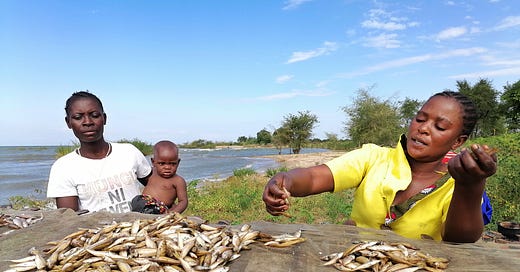FISH DAY - Reviving save Chambo campaign: A resurgence after two decades
Initiative seeks to safeguard Chambo fish species, cherished by many Malawians, along with other species, through promotion of sustainable utilization and the implementation of best practices

SALIMA, Malawi (Planet Defence) - The Ministry of Natural Resources and Climate Change, in collaboration with the Department of Fisheries, led Malawians in commemorating Fisheries Open Day at Chilambula Fish Landing Site, situated in the area of Traditional Authority Kambalame area within Salima district.
Honourable Dr. Michael Usi, the responsible Minister, graced the ceremony, also marking the launch of the Save the Chambo Campaign.
Supported by the UN Food and Agriculture Organization under the Fisheries Resilience for Malawi (FiRM) Project, this initiative aims to protect and conserve the Chambo fish species, a culinary delicacy for many Malawians, and other fish types by promoting sustainable utilization and enforcing best fisheries practices.
Remarkably, a similar plan on chambo restoration was piloted at the country level two decades ago.
The Fisheries Open Day celebrations revolved around the theme: "Build enabling policy environments for small-scale artisanal fisheries."
This theme resonates profoundly with the principles outlined in the FAO Guidelines for Securing Sustainable Small-Scale Fisheries. It emphasizes the need for inclusive policies that actively involve local communities and stakeholders in decision-making processes.
These guidelines provide a framework for Participatory Fisheries Management, a crucial process in managing the invaluable fisheries of Lake Malawi.
Addressing the gathered audience during the celebration, the minister stressed the importance of discipline and adherence to laws governing the sustainable utilization of fisheries resources. This discipline is essential for preserving the Chambo species and other fish found in Lake Malawi and other water bodies across the country.



He emphasized that the highest form of discipline is required to ensure the preservation of the country's natural resources, including fish.
Malawi's declining fish populations are not only a concern at the village level but also a national and global issue. Lake Malawi's cichlid species stand as one of Earth's biological wonders. The lake is estimated to be home to around 750 to 1,000 cichlid species, found exclusively in this lake and nowhere else on the planet.
Tropical fish biologists highlight that Lake Malawi contains more freshwater species than all the lakes in Europe and North America combined. Recognizing its significance, UNESCO declared Lake Malawi a World Heritage Site in 1984.
Since 1998, the Malawian government has collaborated with German scientists to balance the economic needs of villagers, the protein requirements of the people, and the long-term sustainability of Lake Malawi's ecosystem.
Their plan emphasizes the diversification of village economic opportunities and increased community participation in the planning and sustainability of fisheries resources.
"The approach aims to shift the fisheries management system from top-down control to participatory collaborative management, empowering fishing communities to manage their fish resources sustainably," stated project documents.
Reflecting on the two-decade journey to reverse the dwindling catches of Chambo, a campaign was launched in 2003 with the full support of the Cabinet Committee for Natural Resources and Environment.
Dubbed "Nation, Save the Chambo," the campaign mobilizes all Malawians toward a sustainable program for Chambo sustainability. It also seeks to attract both foreign and domestic funding to restore stocks to pre-1990 levels.



